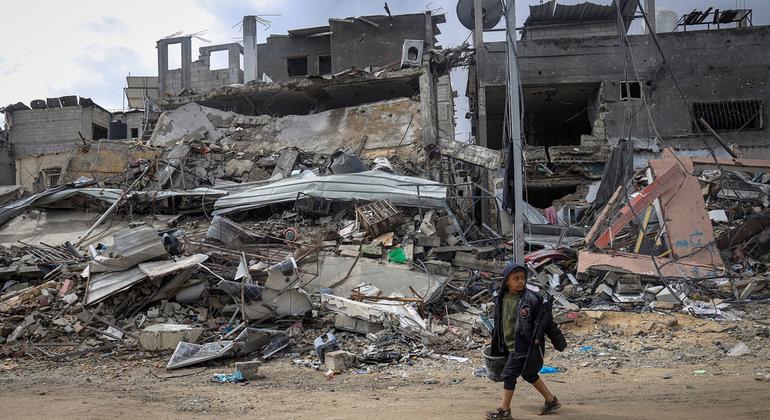Painting a grim landscape of the world’s war zones, Virginia Gamba, the UN Secretary-General’s Special Representative for Children and Armed Conflict, briefed ambassadors, citing grave concerns, from war-torn Gaza to gang-ravaged Haiti, where famine looms amid rampant violence and displacement.
Denying aid access has long-lasting effects on children’s wellbeing and development, she said.
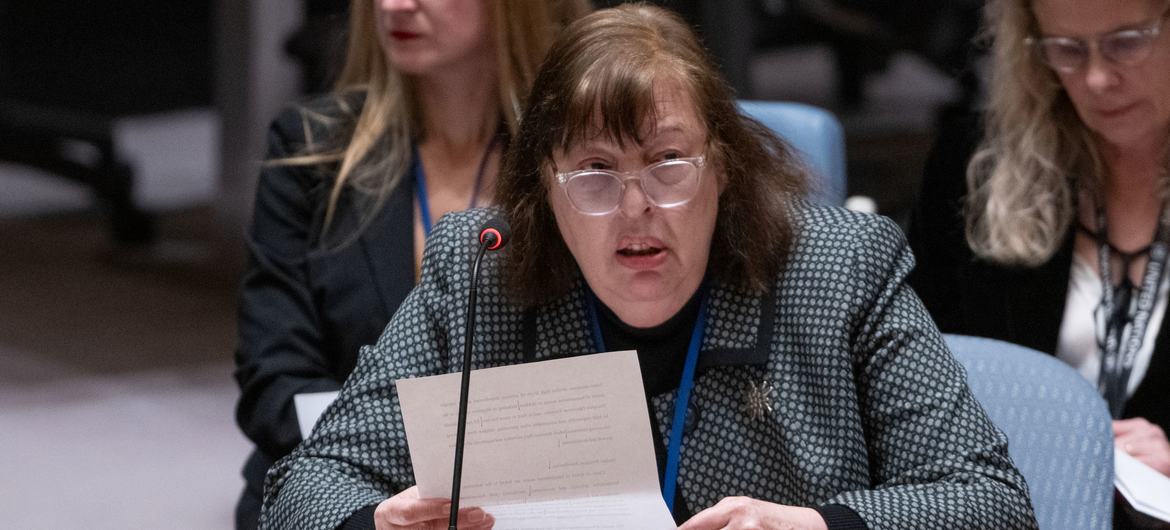
Virginia Gamba, Special Representative of the Secretary-General for Children and Armed Conflict, briefs members of the UN Security Council.
Grave violations of international law
“Let me be very clear,” she said. “The Geneva Conventions and the Convention on the Rights of the Child contain key provisions requiring the facilitation of humanitarian relief to children in need.
“The denial of humanitarian access to children and attacks against humanitarian workers assisting children are also prohibited under international humanitarian law.”
The UN’s engagement with combatants to end and prevent violations against children is critical, she said.
Unfortunately, data gathered for her forthcoming 2024 report shows “we are on target to witness a shocking increase of the incidents of the denial of humanitarian access globally,” she said, adding that “the blatant disregard for international humanitarian law continues to increase.”
“Without compliance by parties to conflict to allow safe, full and unhindered access for the timely delivery of humanitarian assistance, children’s survival, wellbeing and development are in jeopardy, and our calls are mere echoes in this Chamber,” she told the Council.
“We cannot prevent denial of humanitarian access to children unless we understand it and reinforce our capacity to monitor and prevent its occurrence. We must get on with the job.”
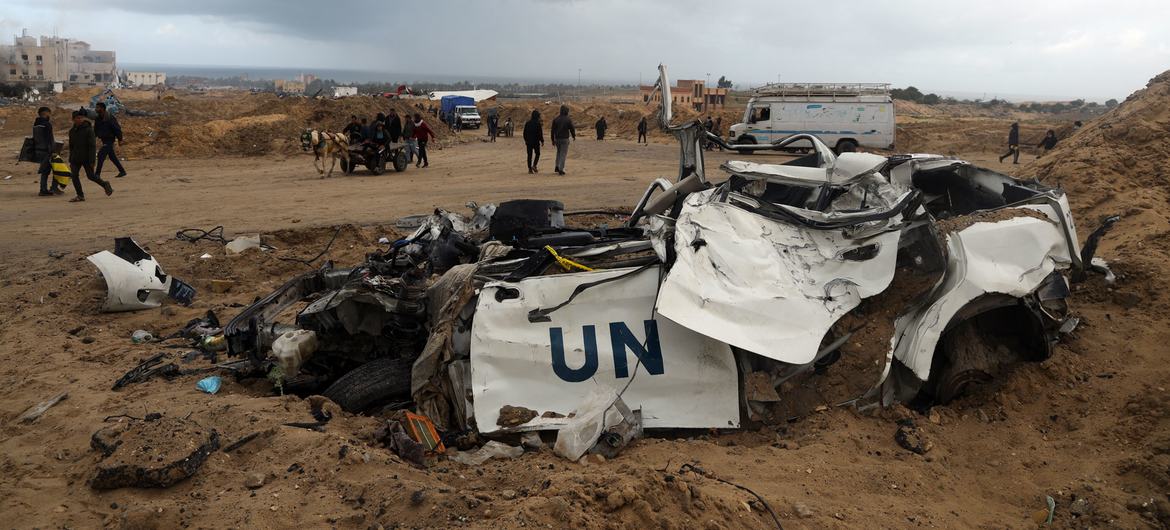
A destroyed UN vehicle in Khan Younis in southern Gaza.
Gaza: Children facing ‘staggering’ conditions
Also briefing the Council, UNICEF Deputy Executive Director Ted Chaiban, said that as conflicts proliferate around the world, grave violations against children continue, including in Gaza, Sudan and Myanmar.
“The denial of humanitarian access is a particularly pervasive, multifaceted and complex grave violation,” he said. “These actions have devastating humanitarian consequences for children.”
Recalling his visit to Gaza in January, he said he witnessed a “staggering decline in conditions of children” amid widespread destruction, a “quasi blockage on the north of Gaza” and repeated denials for or delays in granted access of humanitarian convoys.
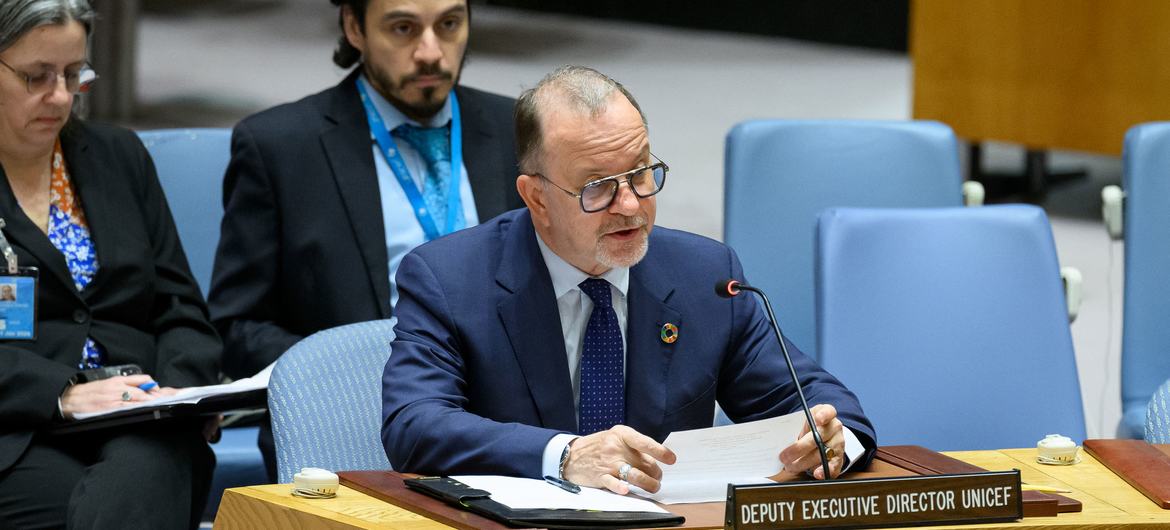
Ted Chaiban, UNICEF Deputy Executive Director for Humanitarian Action and Supply Operations, briefs the UN Security Council meeting on children and armed conflict.
Killing aid workers ‘trying to feed starving people’
“Attacks on humanitarian workers have also gravely affected humanitarian access with the highest UN staff death toll in our history, our UNRWA colleagues in particular, and new attacks this week with the death of our World Central Kitchen colleagues, killing humanitarian workers trying to feed starving people,” Mr. Chaiban said.
As a result of these constraints, children cannot access age-appropriate nutritious food or medical services and have less than two to three litres of water per day, he said.
“The consequences have been clear,” he warned. “In March, we reported that one in three children under two years of age in the northern Gaza Strip suffer from acute malnutrition, a figure that has more than doubled in the last two months.”
Dozens of children in the northern Gaza Strip have reportedly died from malnutrition and dehydration in recent weeks and half the population is facing catastrophic food insecurity, he stressed.
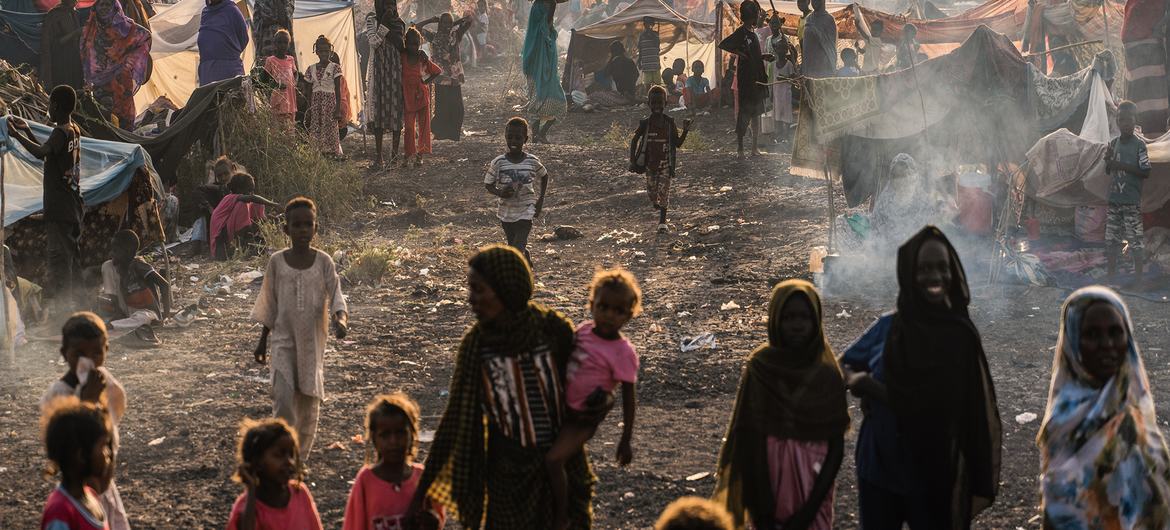
Every month, thousands of people in Sudan still migrate to nearby countries like South Sudan and Chad.
Sudan: ‘World’s worst child displacement crisis’
In Sudan, the world’s worst child displacement crisis, the violence and blatant disregard for permission to allow the delivery of humanitarian assistance essential to protect children from the impact of conflict in Darfur, in Kordofan, in Khartoum and beyond has greatly intensified their suffering, he said.
“We are seeing record levels of admissions for the treatment of severe acute malnutrition (SAM) – the deadliest form of malnutrition,” the UN deputy chief explained, “but insecurity is preventing patients and health workers from reaching hospitals and other health facilities.”
Assets and staff attacked
Assets and staff are still being attacked, and the health system remains overwhelmed resulting in severe shortage of medicines and supplies, including lifesaving items, due to the severe interruption of the supply management system.
“Our inability to consistently access vulnerable children means protection by presence is simply not possible and that risks of other grave violations may escalate without an attendant rise in our ability to monitor or respond,” he said.
He called on the Security Council to use its influence to prevent and end the denial of humanitarian access to children, protect humanitarian workers and allow aid agencies to safely reach those in most need, across frontlines and across borders.
Watch the Security Council President for April, Vanessa Frazier of Malta, speak to reporters after the briefing on children and armed conflict.

